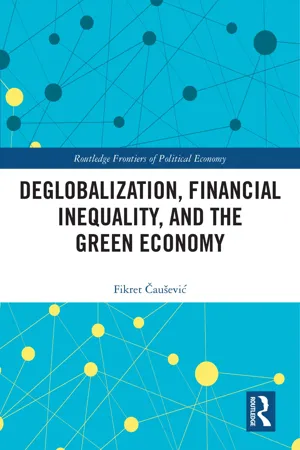
- 162 pages
- English
- ePUB (mobile friendly)
- Available on iOS & Android
Deglobalization, Financial Inequality, and the Green Economy
About This Book
One of the most challenging issues for the current state of global economy is a highly uneven distribution of global financial assets and liabilities. Drawing on extensive data, this book analyses the new global divisions in economic and financial inequality across the globe in the first two decades of this century.
After outlining the context of the global financial system in the aftermath of the Global Financial Crisis of 2008/2009, this book provides a detailed examination of the data on economic and financial inequality, analysing growth rates relative to financial liabilities and assets for all countries where data is available. The central issues in understanding the financial and environmental efficiency of economic growth are also addressed as well as the development of financial and regulatory technologies (FinTech and RegTech). The final part of this book explores the changes in economic growth and financial assets/liabilities as a result of major events in the past three years: Covid Crisis, the rise of inflation and the Russian invasion of Ukraine. The focal point of this analysis is the relationship between the speed of economic growth, the use of financial resources for funding that growth and levels of inequality. The green transition, as one of the most important challenges in the global economy, is an integral part of this analysis, along with the inequality in available financial resources for this transition and potential threats to global financial stability.
This book will be vital reading for those interested in inequality, financial economics, the global financial system and economic growth.
Frequently asked questions
Table of contents
- Cover
- Half Title
- Series Page
- Title Page
- Copyright Page
- Table of Contents
- Preface
- 1 Globalization and deglobalization – introduction and literature review
- 2 The world economy in 2000–2020
- 3 Global financial inequality: 2000–2020
- 4 Economic growth in the context of financial and environmental efficiency
- 5 Disequilibrium economics and Black and Green Swans
- 6 FinTech and RegTech and their role in the structure of finance
- Concluding remarks
- Appendix – Tables
- Index